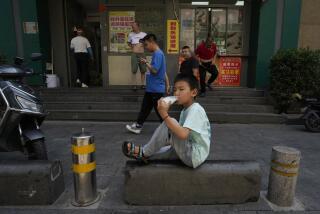China Renews Pledge to Stimulate Region’s Economies
- Share via
BEIJING — Saying it is China’s “ethical and moral” duty to help its Asian neighbors out of their economic crisis, China’s top banker said Saturday that the country is prepared to spend $1 trillion on infrastructure projects in the next three years and loosen controls on lending to spur the country’s huge domestic market.
“Especially after the Asian financial crisis,” Central Bank Gov. Dai Xianglong said in a news conference, “China has all the reason in the world to expand domestic demand and exploit its domestic market.”
Repeating a pledge first made by China’s vice premier, Li Lanqing, at the World Economic Forum in Davos, Switzerland, in February, Dai said China is prepared to spend $337 billion in 1998 on building projects for roads, railways, ports and water treatment facilities.
The three-year total, Dai said, would be about $1 trillion.
Dai said the world’s most populous country could increase capital spending by 15% this year while still achieving its goal of 8% growth while holding inflation under 3%.
*
However, critics of China’s budget plans, unveiled last week before the National People’s Congress, the country’s supreme legislature now in session, said the spending proposals were disappointingly low--amounting to only 5% more than the 10% increase already announced for fixed investments.
“Where’s the stimulus?” asked Morgan Stanley analyst Andy Xie. “The fiscal stance in this budget is in sharp contrast to the market expectation that China will have a large stimulus package to boost the economy.”
Other international economists doubted China’s ability to finance the projects it has proposed, at least at the scale described.
“It is too soon to tell how quickly and fully China’s much heralded, and incredibly ambitious, new three-year, $750-million to $1-trillion infrastructure program will be implemented in 1998 and 1999, how many jobs it will generate, and whether it will obviate or alleviate pressures to devalue” the Chinese currency, said economist and former U.S. Assistant Secretary of Commerce John Despres.
“In any case, financing even a small fraction will strain China’s lending rates,” Despres said. “Higher deposit rates and massive bond issues that will be needed in the absence of much greater tax revenues will particularly impair the already battered balance sheets and profitability of the state-owned banks.”
Unless the government can identify additional financing sources for its programs in coming months, said Xie, Morgan Stanley will lower its growth-rate forecast for China from 7% to under 6%.
Also on Saturday, Dai said China will lower its capital reserve ratio requirements for state-owned commercial banks by 5 percentage points from the current 21%. He declined to say when the adjustment would come.
The government hopes that the reduction will encourage banks to lend more money for home mortgages. He predicted that mortgage lending will nearly double this year to about $3.6 billion.
So far, China has been able to avoid the severe economic crisis encountered by other Asian countries. A key factor is that, unlike those of the worst-hit of the countries, China’s currency, the yuan, is not fully convertible.
However, Dai said he expects China’s foreign exchange reserves to grow at a slower rate this year because of the crisis.
China’s reserves stood at $139.9 billion at the end of 1997, representing an increase of $34.9 billion from a year earlier. They were $140.3 billion at the end of February.
In an interview published Friday, China’s president, Jiang Zemin, said that “China has not been seriously affected” by the Asian economic crisis.
Jiang added: “We should not underestimate its negative impact on our economy. We should see both its challenges for our economic development and opportunities it may bring us.”
More to Read
Inside the business of entertainment
The Wide Shot brings you news, analysis and insights on everything from streaming wars to production — and what it all means for the future.
You may occasionally receive promotional content from the Los Angeles Times.










